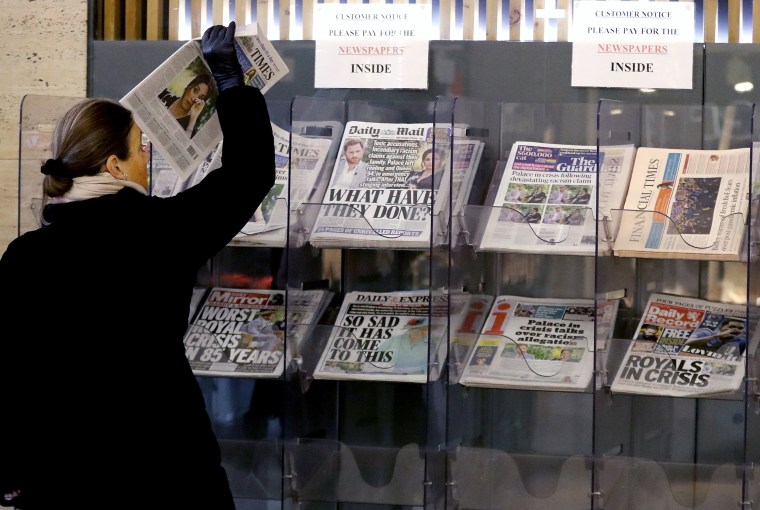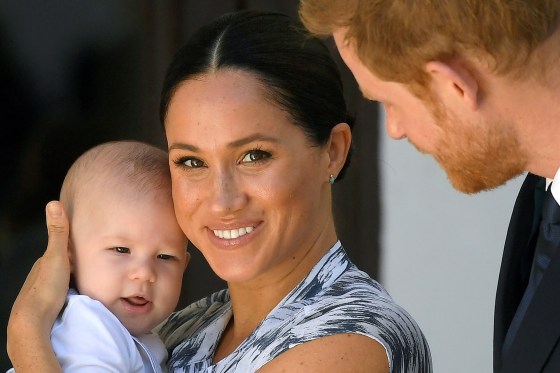LONDON — Prince Harry and Meghan's comments to Oprah Winfrey unraveled issues from mental health to royal protocol, but for many Black Britons they were about one thing: race.
The interview, which aired in the United Kingdom on Monday night, confirmed the "obvious" daily racism experienced by so many, according to Anna Miles, 28, a biracial writer from Manchester, a city in northwest England.
"It's angering and upsetting — this is how we're treated day to day," she said. "It's just a constant reminder of how we're seen and how little Black and brown people are respected."
Meghan said Harry told her that royal insiders had expressed "concerns" about how dark the skin of their children might be. The couple declined to name the individual, but Winfrey later said that Harry had made clear it was neither Queen Elizabeth II, his grandmother, nor her husband, Prince Philip.
Buckingham Palace issued a statement late Tuesday addressing the interview and said the family were "saddened" to learn the extent of the challenges faced by the couple.
"The issues raised, particularly that of race, are concerning," the statement said. "While some recollections may vary, they are taken very seriously and will be addressed by the family privately."
The couple also slammed parts of the British media for what they said was a torrent of racist abuse toward Meghan, whose mother is Black.
It is not the first time the self-exiled royals, who stepped back from working duties last year, have thrust the issue of racism in Britain into the spotlight. Still, the interview dominated U.K. newspapers for a third day Wednesday, and sparked sometimes heated debates on social media and television about the role racism played in the couple's exit.
It also led to the departure of prominent TV broadcaster Piers Morgan from a morning show, hours after storming off set, as the U.K. media regulator announced the show would be investigated amid thousands of complaints regarding his comments about the Duchess of Sussex.
"It confirms what we already knew. The royal family in and of itself is just the lasting remnant of a brutal British empire," Momodou Taal, 27, host of "The Malcolm Effect" podcast, which spotlights race and identity, told NBC News.
Download the NBC News app for breaking news and politics
Queen Elizabeth II is the head of the Commonwealth, a collection of mainly former colonies that maintain links with Britain. Hours ahead of the U.S. broadcast of her grandson's interview on Sunday, she gave a speech to celebrate the network.
Taal, from Birmingham in central England, said that like many young Black men, he had been repeatedly stopped and searched by police and had racist slurs shouted at him in the street. He said it was a realitythat jobs and college access were harder for people of color — noting that Meghan's privilege and wealth had likely shielded her.
Racism had become worse since the 2016 Brexit referendum, he said, adding that it had provoked a "rightward lurch" in the country and stoked fears about foreigners and immigration.

Police in England and Wales have reported an increase in racially motivated hate crimes in the aftermath of the vote to leave the European Union, while government statistics recorded 105,090 hate crimes in the year ending March 2020 — an uptick of 8 percent on the previous year.
"As a Black person who has lived and grown up in the U.K. all my life, we are acutely aware of the racism that exists," Taal said. "The only difference now is someone from the inside now is saying it and laying it bare."
Still, many will be thankful to Meghan and Harry for speaking up and reflecting their struggles, said Halima Begum, the chief executive of the Runnymede Trust, a British race equality think tank.
"If as anti-racists we want to make progress, we are going to have to deal with uncomfortable conversations," she said.
Research by Runnymede has shown that people of color in Britain often feel a greater pressure to "prove" they're British, while many have been on the front lines of the Covid-19 pandemic, facing disproportionate deaths.
British historian Andrew Roberts called the interview "damaging" to the monarchy, due to the "very serious allegations" around racism, adding that it could potentially taint Britain's soft power standing abroad.
"The thing about the royal family is that it's actually about continuity. It's a 1,000-year-old institution that only changes very slowly," he added.
What is more heartbreaking for some Black Britons is the dashed hopes felt since the couple's 2018 star-studded Windsor wedding, which was heralded as a major shift toward greater inclusivity in Britain.
Christina Nicole, 32, whose family is from Jamaica, said she remembered watching the wedding and "feeling so happy."
"I thought that the whole royal family would now become more multicultural and start to represent the U.K." she said from London.
But the furor has left her feeling "disappointed" and let down by the institution of the monarchy, she added.
"It's more than just Meghan. Why are we as Black British women always disrespected and disregarded?" she asked. "It just breaks my heart."

